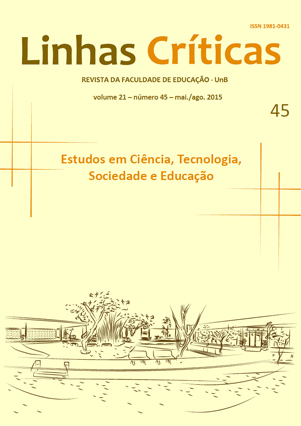Postgraduate studies in science, technology and society: an inclusive proposal
DOI:
https://doi.org/10.26512/lc.v21i45.4549Keywords:
Science;, Technology and society studies;, Postgraduate teaching;, Social inclusion;, Solidarity economy;, Sociotechnical adaptationAbstract
Success of social inclusion policies will make explicit material needs, whose satisfaction demands unique technoscientific solutions for production of goods and services in unusual quantity and of unusual quality. Singular Public policies will have to be developed, based on research and dissemination of original technoscientific knowledge, and exploring the organization of work during their production and circulation. This, in order to make of social inclusion an alternative path of development. The “Sociotechnical Adaptation” proposal for redesigning conventional technology (operated by private companies) and development of Social Technology is a cognitive vector adequate to face this challenge. This requires professionals, an essential element of whose training would be a postgraduate course in Science, Technology and Society Studies.
Downloads
References
BIJKER, Wiebe. Of bicycles, bakelites, and bulbs: toward a theory of sociotechnical change. Massachusetts: The MIT Press, 1995.
BIJKER, Wiebe; HUGHES, Thomas; PINCH, Trevor. The social construction of technological systems. Massachusetts: The MIT Press, 1989.
BLOOR, David. Knowledge and Social Imagery, 2ndedn. Chicago: University of Chicago Press, 1991/1976.
IBGE. Instituto Brasileiro de Geografia e Estatística (2010) Censo Nacional.: Disponível em: <http://www.censo2010.ibge.gov.br/>. Acesso em: 20 maio 2014.
IPEA. Instituto de Pesquisa Econômica e Social. Comunicado do Ipea no. 111. Disponível em: <http://www.ipea.gov.br/agencia/images/stories/PDFs/comunicado/110915_comunicadoipea111.pdf>. Acesso em: 20 maio 2014.
BRASIL. MCTI ”“ Ministério da Ciência, Tecnologia e Inovação. Plano de Ação 2007”“2010. Disponível em: <http://www.mct.gov.br/upd_blob/0021/21439.pdf>. Acesso em: 20 maio 2014.
DAGNINO, Renato. Neutralidade da ciência e determinismo tecnológico: um debate sobre a tecnociencia. Campinas: Editora Unicamp, 2008.
_______Tecnologia social: contribuições conceituais e metodológicas. Eduepb e Insular. Florianópolis, 2014.
_______.Trabalho para orientação do Painel Sociedade do Conhecimento e Educação Superior do Fórum Latino-americano de Educação Superior. Foz do Iguaçu, 17 a 18 de novembro de 2014a.
DAGNINO, Renato; THOMAS, Hernan; DAVYT, Amilcar. El pensamiento en Ciencia, tecnología y sociedad en América Latina: una interpretación política de su trayectoria, REDES, v.3, n.7. 1996.
FEENBERG, Andrew. Transforming technology: a critical theory revisited. Oxford: Oxford University Press, 2002.
HERRERA, Amilcar ‘Los determinantes sociales de la política científica em América Latina. Política científica explícita y política científica implícita’. In: SABATO, Jorge. El pensamiento latinoamericano en la problemática ciencia ”“ tecnologia ”“ desarrollo ”“ dependencia. Buenos Aires: Paidós, 1975.
LEWIS, William Arthur. The theory of economic growth. London: Taylor and Francis, 2003.
ROSTOW, Walt Whitman. The stages of economic growth: a non-communist manifesto. Cambridge University Press, 1960.
Downloads
Published
How to Cite
Issue
Section
License
Copyright (c) 2016 Linhas Críticas

This work is licensed under a Creative Commons Attribution 4.0 International License.
Authors who publish in this journal agree to the following terms:
-Authors maintains the copyright and grants the journal the right of first publication, the work being simultaneously licensed under the Creative Commons Attribution License which allows the sharing of the work with recognition of the authorship of the work and initial publication in this journal.
- Authors are authorized to enter into additional contracts separately, for non-exclusive distribution of the version of the work published in this journal (eg publish in institutional repository or as a book chapter), with acknowledgment of authorship and initial publication in this journal.
-Authorers are allowed and encouraged to publish and distribute their work online (eg in institutional repositories or on their personal page) at any point before or during the editorial process, as this can generate productive changes as well as increase the impact and the citation of published work (See The Effect of Free Access).



